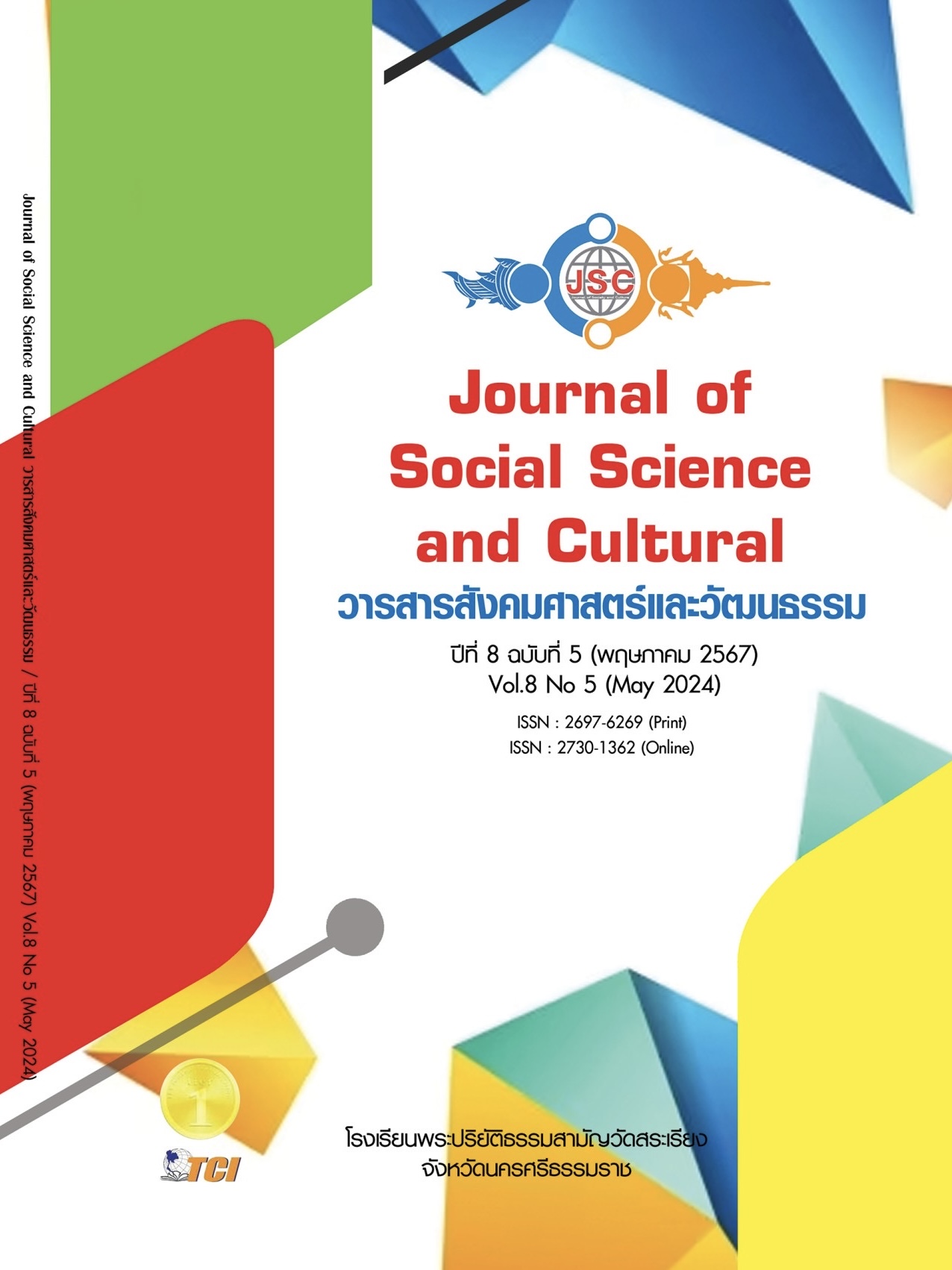DEVELOPMENT OF A PROGRAM FOR PROMOTING ADAPTABILITY OF UNDERGRADUATES BASED ON THE THEORY OF SELF-EFFICACY
Main Article Content
Abstract
This article presents findings from research and development, to develop a program for promoting adaptability of undergraduates based on the theory of self-efficacy. The Research divided into 2 phases as follows: 1) study and analyze basic information to develop a program by content analysis method 2) develop and evaluate the quality of the program by 3 expertise by purposive sampling who graduated in curriculum and instruction program and have teaching experience in undergraduate students. The research tools included 1) an assessment form to measure the accuracy and appropriateness of the program and 2) a content evaluation form to analyze component congruence (Index of Item-Objective Congruence; IOC). The results were found that academic, emotional and society adaptability of undergraduates had 3 components as problem solving, self-regulation and learning capability. The developing program based on self-efficacy consists of 5 components as follows; 1) Principles 2) Specific objective 3) Program contents developed from self-efficacy theory 4) four steps and activities of program as follows: Step 1; evaluating self-capability to setting goal, Step 2; planning according to self-capability and reaching the goal, Step 3; self-monitoring the planning, Step 4; reflecting the performance to be self-efficacy, and 5) measurement and evaluation methods. The result of evaluation program’s quality was appropriate at the highest level ( = 4.77, SD = 0.43) and the consistency index (IOC) of the components of program were 0.67 - 1.00. It means all components of the program are content validity and congruence. The developing program can be used for promoting adaptability of undergraduate students.
Article Details
References
กาญจนา คำสมบัติ และคณะ. (2562). การส่งเสริมการรับรู้ความสามารถของตนเองกับกิจกรรมการเรียนการสอน. วารสารวิจัยมหาวิทยาลัยขอนแก่น (ฉบับบัณฑิตศึกษา) สาขามนุษยศาสตร์และสังคมศาสตร์, 7(3), 69-78.
จุฬาพร คำมุงคุล และคณะ. (2562). รูปแบบความสัมพันธ์เชิงสาเหตุของพฤติกรรมการปรับตัวในการเรียนของนักศึกษาระดับปริญญาตรีสาขาวิทยาการคอมพิวเตอร์. วารสารพฤติกรรมศาสตร์, 25(1), 1-24.
ชนัดดา เพ็ชรประยูร และคณะ. (2554). ความสามารถในการปรับตัวของนักศึกษาชั้นปีที่ 1 ในมหาวิทยาลัยของรัฐ. วารสารวิชาการพระจอมเกล้าพระนครเหนือ, 21(1), 157-166.
เชษฐภูมิ วรรณไพศาล. (2560). ระเบียบวิธีวิจัยทางสังคมศึกษา: หลักการและการประยุกต์. จังหวัดเชียงใหม่: บริษัท ครองช่าง พริ้นติ้ง จำกัด.
โชติกา ภาษีผล. (2559). การวัดและประเมินผลการเรียนรู้. กรุงเทพมหานคร: โรงพิมพ์แห่งจุฬาลงกรณ์มหาวิทยาลัย.
นงลักษณ์ วิชัยรัมย์ และคณะ. (2559). ความสัมพันธ์ระหว่างการปรับตัวด้านจิตสังคมและการมองโลกทางบวก กับการรับรู้สมรรถนะแห่งตนในการควบคุมพฤติกรรมก้าวร้าวในวัยรุ่น. วารสารพยาบาลกระทรวงสาธารณสุข, 26(2), 65-75.
นิลุบล เกตุแก้ว และคณะ. (2566). การพัฒนาโปรแกรมส่งเสริมการเปิดรับประสบการณ์ของนักศึกษาระดับปริญญาบัณฑิตตามแนวคิดความเข้มแข็งทางจิตใจและทฤษฎีพฤติกรรมตามแผน. วารสารสังคมศาสตร์และวัฒนธรรม, 8(2), 138-150.
ปราณี บุญญา และคณะ. (2556). ผลของการฝึกทักษะชีวิตที่มีต่อการปรับตัวและการเห็นคุณค่าในตนเองของนักศึกษามหาวิทยาลัยรังสิต. วารสารการพยาบาลจิตเวชและสุขภาพจิต, 27(2), 30-42.
ภาสิต ศิริเทศ และณพวิทย์ ธรรมสีหา. (2562). ทฤษฎีการรับรู้ความสามารถของตนเองกับพฤติกรรมการดูแลสุขภาพของผู้สูงอายุ. วารสารพยาบาลทหารบก, 20(2), 58-65.
วรภัทร เมฆขจร และคณะ. (2563). ปัจจัยทางจิตสังคมที่เกี่ยวข้องกับพฤติกรรมการตัดสินใจในการเรียนด้วยตนเองของนักศึกษาปริญญาตรี. วารสารพฤติกรรมศาสตร์เพื่อการพัฒนา, 12(1), 74-91.
วัณยรัตน์ คุณาพันธ์ และคณะ. (2561). การศึกษากระบวนการปรับตัวที่มีประสิทธิภาพสำหรับนักศึกษาในสถาบันอุดมศึกษาเอกชน. วารสารศึกษาศาสตร์ มมร, 6(2), 90-103.
วารินทร์ รามฤทธิ์. (2557). ผลของการจัดโปรแกรมการปรับตัวเพื่อพัฒนาการปรับตัวด้านการเรียนของนักศึกษาชั้นปีที่ 1 คณะวิทยาการจัดการ มหาวิทยาลัยสงขลานครินทร์. ใน วิทยานิพนธ์ศิลปศาสตร มหาบัณฑิต สาขาวิชาพัฒนามนุษย์และสังคม. มหาวิทยาลัยสงขลานครินทร์.
สำนักปลัดกระทรวงการอุดมศึกษา วิทยาศาสตร์ วิจัยและนวัตกรรม. (2565). แผนด้านการอุดมศึกษา เพื่อผลิตและพัฒนากำลังคนของประเทศ พ.ศ. 2564 - 2570 ฉบับปรับปรุง พ.ศ. 2566 - 2570. กองยุทธศาสตร์และแผนงาน: สำนักงานปลัดกระทรวงการอุดมศึกษา วิทยาศาสตร์ วิจัยและนวัตกรรม.
สุทธิรักษ์ ไชยรักษ์. (2556). รายงานวิจัยสถาบันเรื่องปัญหาการปรับตัวของนักศึกษาชั้นปีที่ 1 มหาวิทยาลัยเทคโนโลยีสุรนารี. เรียกใช้เมื่อ 18 สิงหาคม 2566 จาก https://www.battelleforkids.org/wp-content/uploads/2023/11/P21_Framework_Definitions_New_Logo_2015_9pgs.pdf
สุภาพร ชูสาย. (2556). การศึกษาบุคลิกภาพและความสามารถในการปรับตัวของนักศึกษาชั้นปีที่ 1 คณะครุศาสตร์ มหาวิทยาลัยราชภัฏเพชรบูรณ์. ราชภัฏเพชรบูรณ์สาร, 15(2), 135-144.
อัจศรา ประเสริฐสิน. (2563). เครื่องมือการวิจัยทางการศึกษาและสังคมศาสตร์. กรุงเทพมหานคร: สำนักพิมพ์จุฬาลงกรณ์มหาวิทยาลัย.
Abood, M. et al. (2020). The Relationship between Personality Traits, Academic Self-Efficacy and Academic Adaptation among University Students in Jordan. International Journal of Higher Education, 9(3), 120-128.
Bandura, A. (1977). Self-efficacy: Toward a unifying theory of behavioral change. Psychological Review, 84(2), 191-215.
Bandura, A. (1994). (1994). Self-Efficacy. In V. S. Ramachaudran (Ed.), Encyclopedia of human behavior (pp. 1-65). San Diago: Academic Press.
Besser, A. et al. (2022). Adaptability to a sudden transition to online learning during the COVID-19 pandemic: Understanding the challenges for students. Scholarship of Teaching and Learning in Psychology, 8(2), 85-105.
Bouffard-Bouchard, T. (1990). Influence of self-efficacy on performance in a cognitive task. The journal of social Psychology, 130(3), 353-363.
Clinciu, A. I. (2013). Adaptation and Stress for the First Year University Students. Procedia-Social and Behavioral Sciences, 78, 718-722. doi: 10.1016/j.sbspro.2013.04.382.
Martin, A. et al. (2012). Adaptability: Conceptual and Empirical Perspectives on Responses to Change, Novelty and Uncertainty. Australian Journal of Guidance and Counselling, 22(1), 58-81.
Mills, N. et al. (2007). Self-efficacy of college intermediate French students: Relation to achievement and motivation. Language learning, 57(3), 417-442.
Sharma, B. (2012). Adjustment and Emotional Maturity Among First Year College Students. Pakistan Journal of Social & Clinical Psychology, 9(3), 32-37.
Silver, W. S. et al. (1995). Responses to Successful and Unsuccessful Performance: The Moderating Effect of Self-Efficacy on the Relationship between Performance and Attributions. Organizational Behavior and Human Decision Processes, 62(3), 286-299.
The Partnership for 21st Century Learning. (2015). P21 framework definitions. Retrieved March 1 , 2024, from http://www.p21.org/storage/documents/docs/P21_Framework_Definitions_New_Logo_2015.pdf
Yu Jin, X. et al. (2019). The effects of academic adaptability on academic burnout, immersion in learning, and academic performance among Chinese medical students: a cross-sectional study [article]. BMC Medical Education, 19(1), 1-8.
Zhang, K. et al. (2021). Adaptability Promotes Student Engagement Under COVID-19: The Multiple Mediating Effects of Academic Emotion [Original Research]. Frontiers in Psychology , 11. doi:10.3389/fpsyg.2020.633265.


